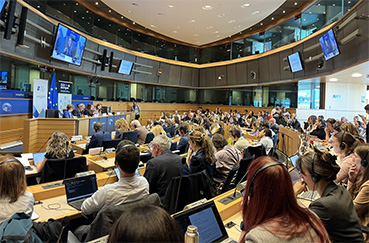On May 13, the European Parliament in Brussels hosted the first meeting of the Intergroup on Social Economy and Services of General Interest, established after the recent European elections. The meeting, dedicated to the upcoming revision of the Public Procurement Directive, allowed participants to debate the importance of an economy working for the collective interest. The event was organized by Social Economy Europe (SEE) and SGI Europe with the European Parliament, and featured the participation of the European Commission’s Executive Vice-President and Commissioner for Skills, Education, Quality Employment, and Social Rights, Roxana Minzatu, alongside senior government officials and MEPs of the Intergroup.
MEP Maravillas Abadía opened the session by highlighting the role of public procurement as a driver for change in the EU. She emphasized that public procurement should promote social clauses. “It is a powerful tool with great transformative potential, combining economic prosperity with social objectives,” she said, calling on the European Commission to adopt a strong and coherent political direction to place social economy at the heart of EU policies.
Similarly, Spanish Deputy Prime Minister and Minister of Labour and Social Economy Yolanda Díaz advocated for an ambitious revision of the Directive. She stated: “We are facing unfair competition from the traditional economy. We need positive discrimination in favor of sectors focused not only on profit but also on social impact. Institutions must ensure this, for example, through social clauses.”
Díaz also recalled that the Social Economy in the EU includes 4.3 million enterprises and entities and 11.5 million paid jobs, according to the latest European Commission report by Euricse and CIRIEC. She stressed: “The social economy is key to the EU’s future. I ask the Intergroup to take on the task of promoting its development. No other economy reflects EU values so strongly.”
French Minister Delegate for Social Economy Véronique Louwagie expressed her commitment to the upcoming National Plan for Social Economy, following the EU Council’s Recommendation to promote enabling frameworks for social economy across all Member States. She also supported the inclusion of social economy enterprises and SMEs in public procurement.
The Role of the European Commission
Executive Vice-President and Commissioner Roxana Minzatu assured in her speech that all actors in the social economy can count on her support and expertise for the upcoming revision of the Directive, as she implemented it in Romania in 2014.
She stated that the social economy “is a true engine for inclusive growth: from agriculture to energy, from reuse to culture. We need a competitive model that puts people first. This Commission is committed to building strong Services of General Interest and a solid Social Economy across Europe.”
She also announced the partial review of the European Action Plan for the Social Economy, presenting it as a key opportunity to consolidate existing policies and define new measures adapted to the current context.
Closure of the Social Economy Unit at DG GROW
Social Economy Europe President Juan Antonio Pedreño regretted the closure of the Social Economy Unit at DG GROW. However, he affirmed that due to its commitment and strength, the social economy will continue to hold a prominent place in the EU, thanks to its transformative power amid multiple crises.
The meeting featured a roundtable with Ana Umbelino (President of REVES), Alain Coheur (member of the EESC and CIRIEC-International), and Luigi del Giacco (SGI Europe), who shared concrete examples of how to consider criteria beyond price in public procurement to benefit territories, workers, and citizens.
MEP Irene Tinagli, as Intergroup co-chair, reaffirmed the European Parliament’s commitment to the topic. “We need a change in policies and practices: quality must not be sacrificed for lower prices,” she stressed. For Tinagli, social economy “is a growth engine and the most sustainable model in the long term.”
At the closing, Valentina Schaumburger, member of Commissioner Stéphane Séjourné’s Cabinet, presented two priorities for the Directive’s revision: simplification and its use as a tool for more sustainable public procurement.
The event concluded with remarks from MEP Camilla Lauretti and Pascal Bolo, President of SGI Europe, highlighting the importance of supporting both Services of General Interest and the Social Economy in providing services to all citizens. “Investing in them is essential. As the EU, building our strategic autonomy is more important than ever.”
After the event, SEE President Pedreño concluded: “The commitment shown today by the main political forces in the European Parliament reflects their ongoing support for the social economy and strengthens Commissioner Minzatu’s mandate to lead this effort from the European Commission.”







